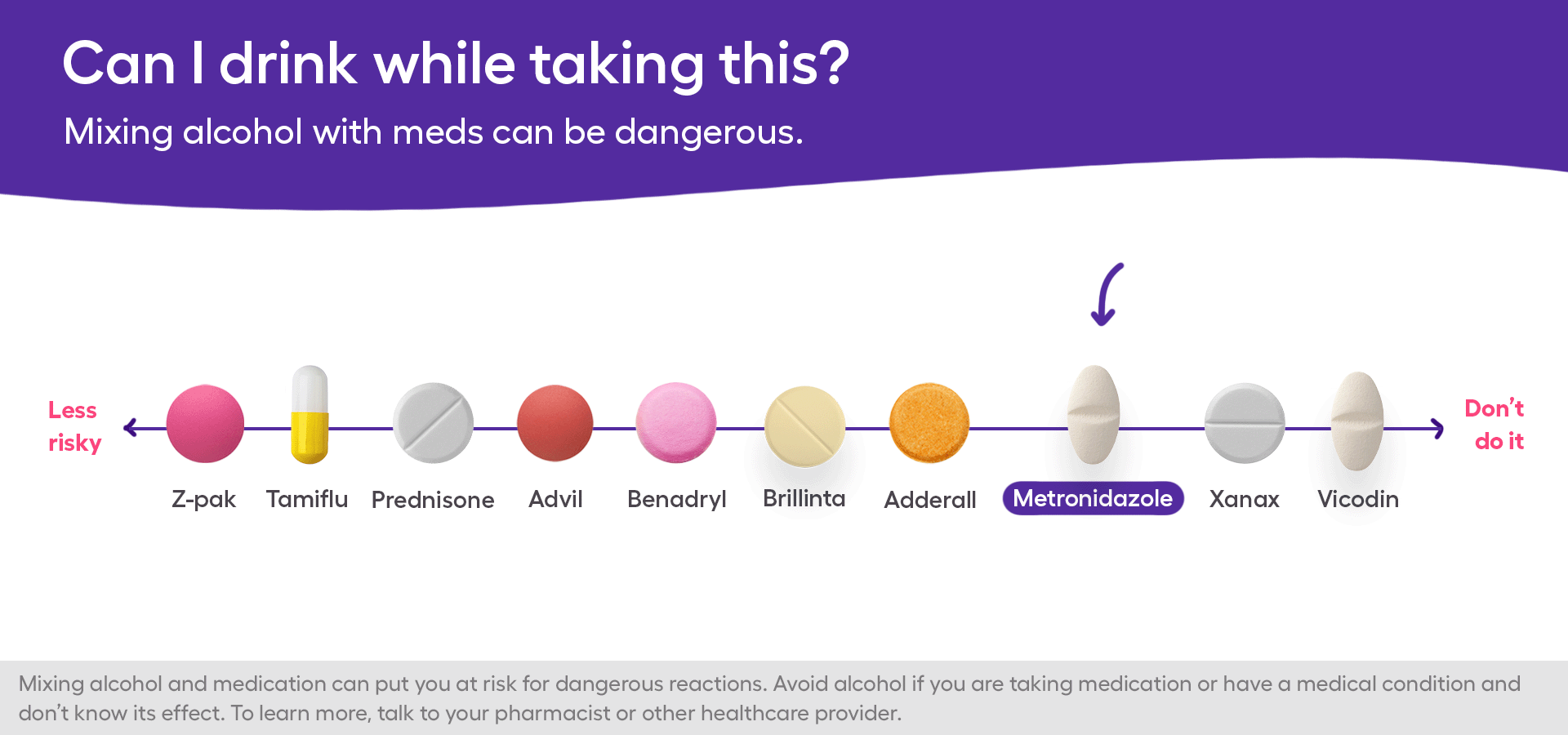A healthcare provider will prescribe metronidazole if you have a particular bacterial or parasitic infection. When you pick up your prescription from the pharmacy, your pharmacist may ask if you have any questions about metronidazole, especially if it’s your first time taking it. They may also recommend you hold off on drinking alcohol during your course of metronidazole treatment. Otherwise, a metronidazole and alcohol interaction could arise, causing unpleasant or dangerous side effects.
While healthcare providers typically recommend avoiding alcohol with metronidazole, the scientific literature you might find on the topic is mixed. For example, studies show that not everyone experiences an interaction between alcohol and metronidazole. Still, it’s best to stay cautious, and you’ll probably want to avoid alcohol while recovering from an infection anyway
What is metronidazole?
Metronidazole is a commonly prescribed antimicrobial drug used to treat a variety of parasitic and bacterial infections, including gastrointestinal, respiratory tract, bacterial vaginosis, and liver infections. Metronidazole is the generic version of the brand-name drug Flagyl, and it belongs to a class of antimicrobial drugs called nitroimidazoles. Metronidazole has a unique mechanism of action that allows it to be an effective drug against anaerobic bacteria (bacteria that live in conditions with little or no oxygen) and protozoan parasites (microscopic organisms).
Metronidazole is often administered as an oral capsule or tablet. It is also available in topical, vaginal, and intravenous (IV) forms. Depending on the infection, metronidazole is usually taken up to three times daily for several days.
RELATED: How much is metronidazole without insurance?
Can you drink alcohol while taking metronidazole?
Drinking any beverages or products containing alcohol, including propylene glycol, is not recommended while taking metronidazole. Drinking alcohol with metronidazole can lead to adverse effects ranging in severity from mild to serious. It is also important to be aware of the possible ethanol or alcohol content of over-the-counter (OTC) medications or other prescription drugs you may be taking. Medications that contain alcohol may include elixirs, tonics, and cough or cold syrups.
Examples of prescription drugs that contain alcohol
- Dexamethasone elixir
- Dexamethasone Intensol
- Diclofenac sodium solution
- Furosemide solution
- Promethazine syrup
There is no metronidazole and alcohol myth. The interaction between metronidazole and alcohol is a real possibility. There are numerous reports of adverse effects from mixing metronidazole and alcohol, and there has even been a case report of a death attributed to combining metronidazole and alcohol.
People at risk of serious side effects with metronidazole and alcohol
Different factors may increase the risk of experiencing severe reactions from mixing alcohol and metronidazole. For instance, people who have trouble processing metronidazole may have higher drug levels in their system, which may be more dangerous when alcohol is consumed. The following people are at a higher risk of a serious metronidazole and alcohol interaction.
People with liver dysfunction: Metronidazole and alcohol are processed by the liver. Having liver disease or other liver problems can affect how well metronidazole and alcohol are processed and eliminated from the body. People with liver damage may experience higher blood levels of metronidazole and alcohol, which may lead to increased side effects.
Older people: People of older age may experience a higher risk of liver disease. Older adults may also have an increased sensitivity to alcohol and a decreased ability to metabolize medication, which could lead to worsened side effects of a metronidazole and alcohol interaction.
People with certain health conditions: Alcohol intolerance has been linked to Hodgkin lymphoma in some people. In addition, women with uterine, breast, and ovary tumors have been found to be more likely to have a reaction to drinking alcohol.
People who take several medications: People who take certain medications that block the CYP450 enzyme (an enzyme in our bodies responsible for metabolizing medications and toxins), such as Tagamet (cimetidine), may experience increased blood levels of metronidazole. High levels of metronidazole may contribute to an increased risk of certain side effects, especially if metronidazole is combined with alcohol.
What happens if you drink alcohol with metronidazole?
To understand how metronidazole interacts with alcohol, you have to understand how alcohol is metabolized or processed in the body. Ethanol is metabolized by the liver. Under normal circumstances, an enzyme called alcohol dehydrogenase breaks down ethanol into acetaldehyde, a toxic molecule that can cause uncomfortable side effects, such as headache, flushing, nausea, and vomiting. Then, an enzyme called aldehyde dehydrogenase breaks down acetaldehyde into acetate, a less toxic byproduct of acetaldehyde that can be further broken down and eliminated from the body as carbon dioxide and water.
Metronidazole and alcohol interaction
Metronidazole is believed to interfere with and block the aldehyde dehydrogenase enzyme, however this has not been fully established. In other words, metronidazole may cause acetaldehyde to build up in the body, which can lead to unpleasant side effects. It can take between 25 minutes and 4 hours for metronidazole to reach maximum levels in the body. As a result, side effects could develop quickly after combining metronidazole and ethanol.
Side effects of mixing metronidazole and alcohol include:
- Nausea
- Vomiting
- Abdominal pain
- Headaches
- Flushing
- Rapid heart rate or heart palpitations
These side effects are collectively referred to as a disulfiram-like reaction. Disulfiram is a medication used to treat alcohol addiction that blocks the aldehyde dehydrogenase enzyme, leading to increased acetaldehyde levels.
The FDA label warning regarding acetaldehyde and alcohol use is based on in vitro studies, or studies involving reactions between metronidazole and alcohol in a test tube. In vivo studies, or studies conducted in actual humans, however, show conflicting information.
In a double-blind clinical trial, 12 healthy male adults were divided into two groups: one group received metronidazole and the other received a placebo for five days. Blood samples were taken every 20 minutes for four hours to check acetaldehyde levels. Ultimately, researchers found that acetaldehyde levels did not significantly change with the use of metronidazole.
Some researchers suggest that the disulfiram-like reaction could be attributed to alcohol or metronidazole alone, and not all patients who mix metronidazole and alcohol may experience adverse effects. There have been no reports that specify the amount of alcohol consumption and dose of metronidazole that cause these side effects.
Metronidazole and alcohol side effects
The most common side effects of metronidazole include:
- Headache
- Nausea
- Yeast infections
- Dizziness
- Diarrhea
- Itching
- Stomach pain
- Dry mouth
Rare but serious metronidazole side effects may include:
- Encephalopathy
- Peripheral neuropathy
- Seizures
The central nervous system (CNS) and gastrointestinal side effects of alcohol and metronidazole can overlap. Combining metronidazole and alcohol could lead to an increased risk of these side effects.
If you accidentally drank alcohol while taking metronidazole, you may experience side effects. However, mild side effects should resolve on their own. If you experience serious side effects, such as severe vomiting, chest pain, a sudden drop in blood pressure, or trouble breathing, seek emergency medical attention.
If you have any concerns after combining metronidazole with alcohol, always consult your healthcare provider for medical advice.
How long after taking metronidazole can I drink alcohol?
The general consensus, according to the drug manufacturers and healthcare provider recommendations, is to avoid drinking alcohol during treatment with metronidazole and for three days after stopping the medication. The average half-life of metronidazole in healthy individuals is around eight hours. As a result, waiting for a few days after stopping treatment can ensure the drug is completely eliminated from the body. The lower the levels of metronidazole while drinking alcohol, the lower the risk of a medication interaction.
How long metronidazole stays in the body depends on a person’s health conditions and what other medications they are taking. Some health conditions, such as liver or kidney disease, and certain medications, such as cimetidine, may interfere with how fast metronidazole is cleared from the body. A decreased metabolism of metronidazole could mean a longer period that metronidazole stays in your system.
The bottom line
The evidence surrounding the metronidazole and alcohol interaction is not entirely clear. Nonetheless, healthcare professionals tend to advise caution with alcohol while taking metronidazole.
It’s best to avoid beverages or products containing alcohol while taking metronidazole and for three days after taking the last dose of metronidazole. Combining alcohol with metronidazole may lead to a disulfiram-like reaction with symptoms such as nausea, headache, and flushing.
Always consult a healthcare provider if you have any questions or concerns about your medications, their side effects, and possible drug interactions.












